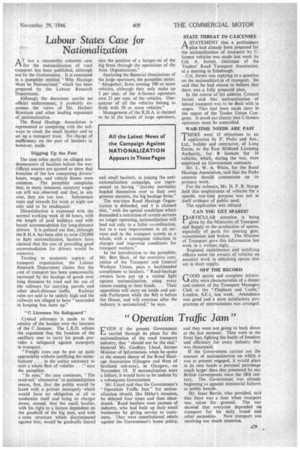Labour States Case for
Page 31

If you've noticed an error in this article please click here to report it so we can fix it.
Nationalization
AT last a reasonably coherent case for the nationalization of road transport has been published, although not by the Government. It is contained in a pamphlet entitled "Why Haulage Must be Nationalised," which has been prepared by the Labour Research Department.
Although the document carries no official endorsement,. it probably expresses the views of Mr. Herbert Morrison and other leading exponents of nationalization.
The Road Haulage Association is represented as conspiring with the railways to crush the small haulier and to set up a transport trust. No 'charge of inefficiency on the part of hauliers is, however, made.
Digging Up the Past The case relies partly on alleged misdemeanours of hauliers before the war. Official sources are quoted to show that breaches of the law concgrning drivers' hours, wages, and vehicle fitness were common. The pamphlet complains that, in many instances, statutory wages are still not observed and that, in any case, they are too low. Subsistence rates and rewards for work at night are alio said to be inadequate: Dissatisfaction is expressed with the normal working week of 48 hours, with the length of paid holidays • and with hostel accommodation for long-distance drivers. It is pointed out that, although the R.H.A. has been able to raise £20,000 to fight nationalization, hauliers have claimed that the cost of providing good accommodation for drivers would be excessive.
Turning to economic aspects of transport organization, the Labour Research Department claims that the cost of transport has been unnecessarily increased by the haulage of goods over long distances by road and the use of the railways for carrying parcels and other short-distance traffic. Railway rates are said to be unduly high and the railwajrs are alleged to have "succeeded in keeping bus fares up."
"G Licensee No Safeguard" Cynical reference is made to the anxiety of the haulier over the interests of the C licensee. The L.R.D. refutes the argument that the freedom of the ancillary user to Carry his goods provides a safeguard against monopoly in transport.
"Freight rates can be put up quite appreciably withoht justifying the manufacturer . . in the outlay necessary to start a whole fleet of vehicles . . ." says the pamphlet.
"In sum," the case continues, "The road-rail 'alternative' to nationalization means, first, that the public would be faced with a private monopoly which would have no obligation at all to modernize itself and bring its charges down; second, that the small haulier, with his right to a licence dependent on the goodwill of the big Coen, and with a rates structure which discriminated against him, would be gradually forced into the position of a hanger-on of the big firms through the operations of the Area Organizations."
Analysing the financial dssociations of the large operators, the pamphlet states: "Altogether, firms owning 100 or more vehicles, although they only make up 2 per cent, of the A-licence operators own 23 per cent, of the vehicles. Onequarter of all the vehicles belong to finds with 50 or more vehicles."
Management of the R.H.A. is claimed to be in the hands of large operators, and small hauliers, in joining the antinationalization campaign, are represented as having "thereby inevitably handed themselves over to their own greatest enemies, the big haulage firms."
The war-time Road Haulage Organization is defended, and it is claimed that, "with the special conditions which demanded a restriction of certain services no longer operating, nationalization will lead not only to a fuller co-ordination, but to a vast improvement in all services and in the transport system as a whole, with a consequent reduction in charges and improved conditions for transport workers." •
In the introduction to the pamphlet, Mr. Bert Slack, of the executive committee of the Transport and General Workers Union, pays a backhanded compliment to hauliers. "Road-haulage , owners have put up a violent fight against nationalization, using every means coming to their hands. . . Their opposition will carry on inside and outside Parliament while the Bill is before the House, and will continue after the industry is nationalized," he says.
























































































